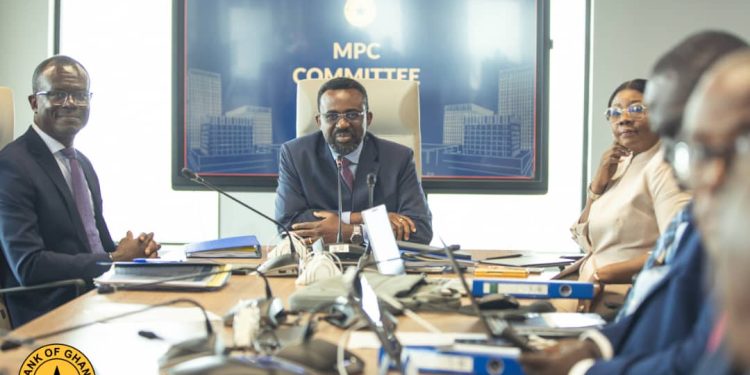BoG Governor Hints at Possible Policy Recalibration Amid Strengthening Economic Recovery
Ghana’s economic recovery is gaining strong traction, with key macroeconomic indicators pointing to sustained progress, the Governor of the Bank of Ghana, Dr. Johnson Pandit Asiama, has stated.
Delivering his opening remarks at the 125th Monetary Policy Committee (MPC) meetings, Dr. Asiama noted that the current macroeconomic landscape may warrant a potential recalibration of the Bank’s monetary policy stance.
“As we commence our deliberations, the question before us is whether the current macroeconomic configuration warrants a recalibration of our monetary policy stance,” he remarked. “With inflation expectations more firmly anchored, external buffers significantly strengthened, and public confidence improving, we must consider how best to support the recovery without compromising the hard-won gains in stability.”
The Governor underscored the need to weigh forward-looking risks such as renewed exchange rate volatility, rising global crude oil prices, and the potential inflationary impact of taxes announced in the mid-year budget review.
Sustained Disinflation and Growth Momentum
Ghana’s disinflation process has strengthened, with headline inflation falling for six consecutive months to 13.7% in June 2025 – the lowest level recorded since December 2021. Dr. Asiama attributed the downward trend in inflation to consistent monetary and fiscal discipline as well as the recent appreciation of the cedi.
On growth, he disclosed that economic activity is picking up steadily, citing provisional GDP figures for the first quarter of 2025 which show a real growth rate of 5.3%, buoyed mainly by the agriculture and services sectors. Non-oil GDP expanded by an even faster 6.8% year-on-year.
The Bank’s Composite Index of Economic Activity also grew by 4.4% in May 2025, driven by increased consumption, higher trade volumes, robust cement sales, and a rebound in tourism. These positive trends, the Governor said, are reflected in improved business and consumer sentiment as captured in recent Purchasing Managers’ Index (PMI) data.
External Sector Rebound and Strong Cedi Performance
The external sector has shown marked improvement. Ghana recorded a provisional trade surplus of US$5.6 billion in the first half of 2025 – more than quadruple the figure recorded during the same period in 2024.
Similarly, the country’s current account surplus widened to US$3.4 billion, supported by higher export revenues from gold and cocoa, strong remittance inflows, and improved investor confidence on the back of successful IMF programme reviews.
The cedi has appreciated sharply against major trading currencies, gaining 42.6% against the US dollar, 30.3% against the British pound, and 25.6% against the euro.
Outlook and Policy Direction
In light of these developments, Dr. Asiama urged MPC members and Bank of Ghana staff to maintain a clear focus on emerging risks, policy trade-offs, and the need to provide credible forward guidance to the market.
“Our mandate is clear: to maintain price stability while enabling the conditions for inclusive and sustainable growth,” he emphasised.
The 125th MPC meetings come at a crucial time, with investors and market participants keenly watching for signals on whether the Central Bank will maintain its tightening posture or begin easing to support the recovery phase.








